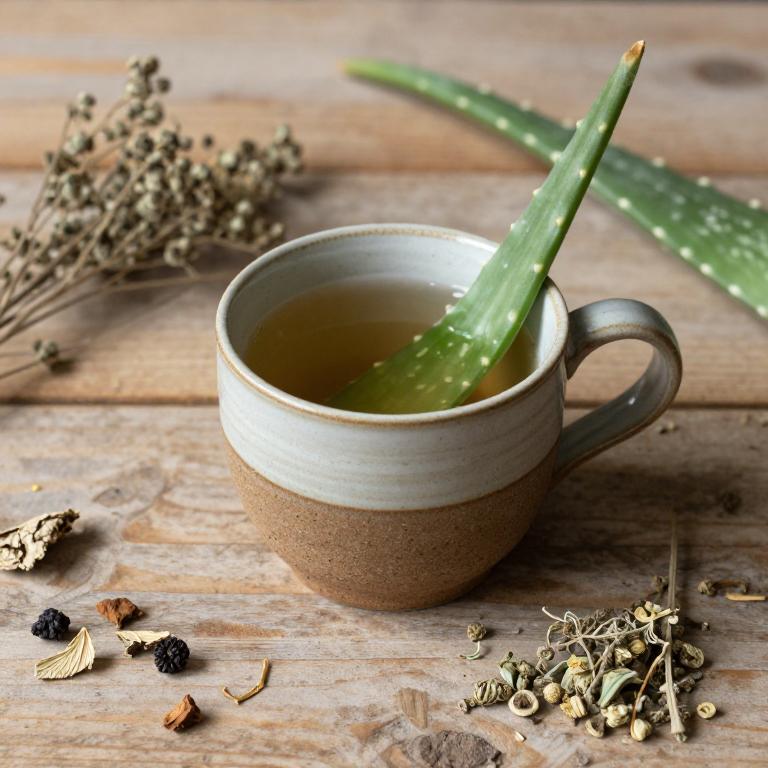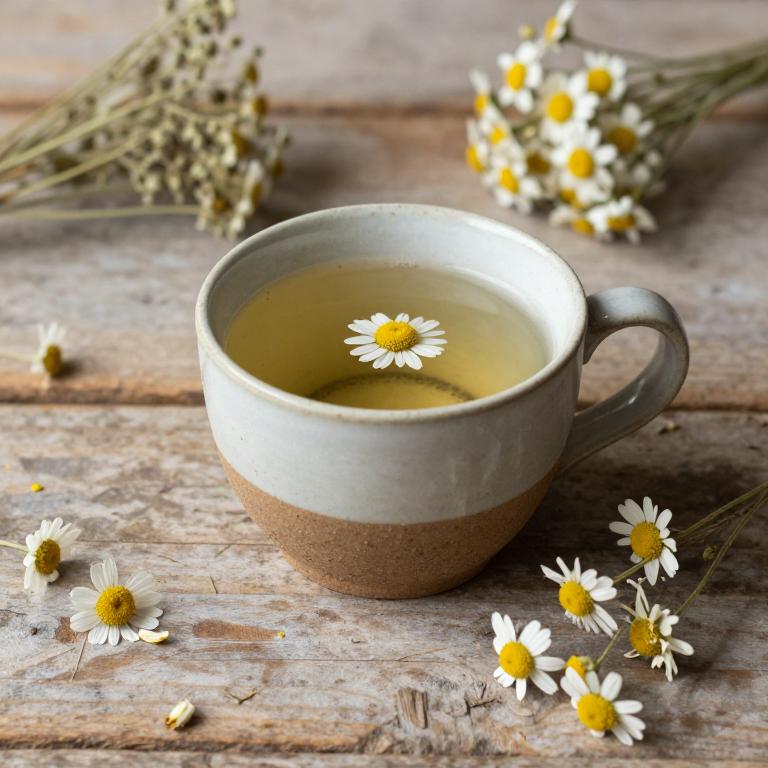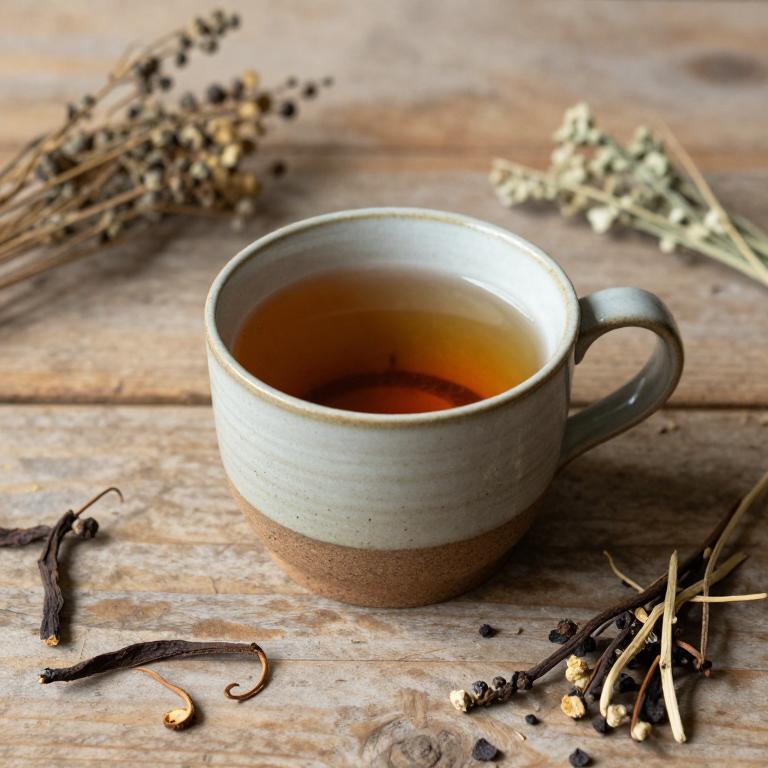10 Best Herbal Teas For Eczema

Herbal teas have gained popularity as a natural remedy for managing eczema symptoms due to their anti-inflammatory and soothing properties.
Chamomile, calendula, and licorice root are commonly used herbs known for their ability to calm irritated skin and reduce redness. These teas can be applied topically as compresses or consumed internally to support overall skin health. While they are generally safe, it's important to consult a healthcare provider before use, especially if you have allergies or are taking other medications.
Incorporating herbal teas into a holistic approach can provide relief and complement traditional treatments for eczema.
Table of Contents
- 1. Chamomile (Matricaria chamomilla)
- 2. Stinging nettle (Urtica dioica)
- 3. St. john's wort (Hypericum perforatum)
- 4. Camellia (Camellia sinensis)
- 5. Aloe vera (Aloe barbadensis)
- 6. Field horsetail (Equisetum arvense)
- 7. Salvia (Salvia officinalis)
- 8. Dog rose (Rosa canina)
- 9. German chamomile (Chamomilla recutita)
- 10. Cancer bush (Sutherlandia frutescens)
1. Chamomile (Matricaria chamomilla)

Matricaria chamomilla, commonly known as chamomile, is a popular herbal tea used for its soothing and anti-inflammatory properties.
It contains compounds like apigenin and bisabolol, which may help reduce skin irritation and inflammation associated with eczema. Chamomile tea can be applied topically as a compress or consumed internally to support overall skin health. Some studies suggest that it may help alleviate symptoms such as redness, itching, and dryness in individuals with eczema.
However, it is important to consult a healthcare provider before using chamomile, especially for those with allergies or existing medical conditions.
2. Stinging nettle (Urtica dioica)

Urtica dioica, commonly known as stinging nettle, has been traditionally used in herbal medicine for its potential anti-inflammatory and skin-soothing properties.
When prepared as a herbal tea, it may help alleviate symptoms of eczema by reducing inflammation and supporting the body's natural healing processes. The tea is typically made by steeping dried nettle leaves in hot water, and it can be consumed internally or applied topically as a compress. Some studies suggest that the high concentration of antioxidants and minerals in nettle may contribute to its beneficial effects on skin health.
However, it is important to consult with a healthcare professional before using nettle tea, especially for those with existing medical conditions or allergies.
3. St. john's wort (Hypericum perforatum)

Hypericum perforatum, commonly known as St. John's wort, is a herbal remedy that has been traditionally used for its potential anti-inflammatory and soothing properties.
While it is more widely recognized for its use in treating mild depression, some studies suggest that it may also be beneficial for skin conditions like eczema due to its ability to reduce redness and irritation. When brewed into a tea, hypericum perforatum can be applied topically or consumed internally, though it is important to consult a healthcare provider before use, as it may interact with certain medications. The herb contains compounds such as hyperforin and flavonoids, which are believed to contribute to its therapeutic effects on the skin.
However, more research is needed to fully understand its efficacy and safety for eczema treatment.
4. Camellia (Camellia sinensis)

Camellia sinensis, the plant from which green and black teas are derived, contains bioactive compounds such as polyphenols and antioxidants that may support skin health.
Some studies suggest that these compounds could help reduce inflammation and oxidative stress, which are often linked to eczema flare-ups. While there is limited direct research on Camellia sinensis herbal teas specifically for eczema, its anti-inflammatory properties may offer potential benefits when consumed as part of a holistic approach to skin care. However, it is important to note that individual responses to herbal teas can vary, and they should not replace medical treatment for eczema.
Consulting with a healthcare provider before incorporating Camellia sinensis teas into a skincare regimen is recommended to ensure safety and effectiveness.
5. Aloe vera (Aloe barbadensis)

Aloe barbadensis, commonly known as aloe vera, has been used for centuries for its soothing and healing properties, and its herbal tea form is gaining popularity for its potential benefits in managing eczema.
This tea is made by steeping the gel of the aloe plant in hot water, releasing compounds such as polysaccharides and antioxidants that may help reduce inflammation and promote skin repair. Some studies suggest that aloe vera can help alleviate symptoms of eczema by moisturizing the skin and reducing redness and itching. However, while it is generally considered safe, it is important to consult a healthcare provider before using aloe tea, especially for those with sensitive skin or existing medical conditions.
Overall, aloe barbadensis herbal tea may serve as a complementary remedy for eczema, though it should not replace professional medical treatment.
6. Field horsetail (Equisetum arvense)

Equisetum arvense, commonly known as field horsetail, has been traditionally used in herbal teas to support skin health and alleviate symptoms of eczema.
This herb is rich in silica, which is believed to strengthen the skin's structural integrity and promote healing. When brewed into a tea, equisetum arvense may help reduce inflammation and soothe irritated skin associated with eczema. However, it is important to consult with a healthcare professional before using it, as it can have diuretic properties and may interact with certain medications.
While some individuals report relief from eczema symptoms through regular consumption of this herbal tea, more research is needed to fully understand its efficacy and safety for long-term use.
7. Salvia (Salvia officinalis)

Salvia officinalis, commonly known as sage, has been traditionally used in herbal teas to support skin health, including the management of eczema.
The essential oils and phytochemicals in sage leaves, such as rosmarinic acid and flavonoids, possess anti-inflammatory and antimicrobial properties that may help reduce skin irritation and infection risks associated with eczema. When brewed into a tea, sage can be applied topically or consumed internally to promote overall immune and skin health. However, it is important to consult with a healthcare provider before using sage tea, especially for individuals with sensitive skin or existing medical conditions.
While some anecdotal evidence suggests potential benefits, more scientific research is needed to fully understand its efficacy for eczema treatment.
8. Dog rose (Rosa canina)

Rosa canina, also known as dog rose, is a traditional herbal remedy often used in the form of tea to support skin health and alleviate symptoms of eczema.
The flowers and hips of the Rosa canina plant are rich in antioxidants, vitamins, and anti-inflammatory compounds that may help reduce skin irritation and promote healing. When brewed into a soothing tea, Rosa canina can be consumed internally to support the body’s natural defenses and improve overall skin condition. It is commonly used in herbal medicine for its calming properties and its potential to reduce redness and itching associated with eczema.
However, it is advisable to consult a healthcare professional before using Rosa canina tea, especially if you have existing medical conditions or are taking other medications.
9. German chamomile (Chamomilla recutita)

Chamomilla recutita, commonly known as German chamomile, is a popular herbal tea used for its calming and anti-inflammatory properties.
It contains compounds like apigenin and bisabolol, which have been shown to reduce skin irritation and redness, making it a potential remedy for eczema. When consumed as a tea, chamomile may help soothe the digestive system, which can indirectly support skin health. Some studies suggest that topical application of chamomile can alleviate symptoms of eczema by reducing inflammation and promoting healing.
However, it is important to consult a healthcare professional before using chamomile, especially if you have allergies or are taking other medications.
10. Cancer bush (Sutherlandia frutescens)

Sutherlandia frutescens, commonly known as "cancer bush," is a traditional South African plant that has gained attention for its potential therapeutic benefits, including its use in herbal teas for eczema.
This herb is believed to support the immune system and reduce inflammation, which may help alleviate the symptoms of eczema. While scientific research on its efficacy for eczema is limited, some studies suggest that its antioxidants and anti-inflammatory compounds may contribute to skin healing. Herbal teas made from Sutherlandia frutescens are often consumed internally to promote overall wellness, though topical applications are also explored for their soothing effects on the skin.
As with any herbal remedy, it is advisable to consult a healthcare professional before incorporating Sutherlandia frutescens into a treatment plan for eczema.